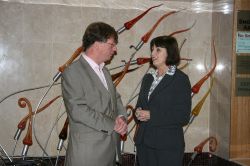
NITL’s annual conference this week heard how logistics and supply chain management (SCM) hold the key to tacking the challenges faced by organisations in Ireland today.
Two leading UK-based academics (Professors Martin Christopher and David Grant) explained to over 150 delegates at Logistics Ireland 2009 that SCM thinking is imperative if firms are to meet increasingly demanding expectations in the market place whilst simultaneously focussing on eliminating waste throughout the supply chain.
Professor Christopher, Europe’s foremost SCM expert based at Cranfield University, stated that “much of the cost in today’s supply chains is there because of the continuing increase in their complexity …. it can be argued that perhaps the biggest opportunity for cost reduction lies in reducing that complexity”. Professor Grant, based at the University of Hull Logistics Institute reinforced this point and noted that it was small and medium sized enterprises (SMEs) which held the key to economic recovery. He noted that “SMEs have an ability to be responsive to customers’ needs as they are typically closer to the customer and the ability to undertake quicker business and logistics decision-making”. This point was clearly illustrated by the Managing Directors of two Irish SMEs, Supplierforce and Pragmatica.
Edward Sweeney of NITL said that “the reality is that global economic volatility has resulted in markets that have become more sophisticated and more complex and customers who have become more discerning. In short customers expect better service and quality at ever more competitive prices. SCM and logistics – with its focus on enhancing customer service while optimising total supply chain cost and investment – have a pivotal role to play in this scenario”. The focus throughout the conference, which was chaired by Ingrid Miley of RTE, was on exploring practical solutions to these pressing challenges.

Edward Sweeney chatting with Ingrid Miley, Industry and Employment Correspondent at RTE, at the conference